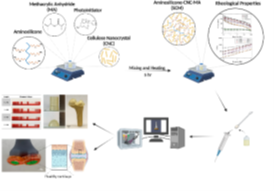Background
Silicone elastomers have been widely utilized in biomedical applications due to their remarkable features such as flexibility, adaptability, and biocompatibility, but the slow curing speed, low viscosity, and hydrophobicity of existing silicone materials are challenges that hinder many applications.
In patients with osteoarthritis the cartilage covering the bones ends in human joints gradually deteriorates. One of the best treatment options is replacement of the cartilage; however, current approaches have failed due to the unique mechanical features and complicated multi-layered 3D structure of articular cartilage (AC).
Description of the invention
Waterloo researchers have developed a novel hydrophilic and rapidly curing silicone-based ink with tunable mechanical characteristics suitable for 3D micro-extrusion (ME) printing. With this technology, one can 3D print personalized (AC) replacements. For instance, the geometry of an AC replacement can be directly rendered from a patient’s own medical images, and the mechanical stiffness of the AC replacement can be tuned according to the patient’s height and weight. There is also the potential to perform in-situ printing or precision repairment with minimal invasion surgery. This new class of inks can be used for the fabrication of personalized and biocompatible tissue-mimetic models and in-situ surgical applications.
Advantages
The developed inks are shown to possess a suitable shear-thinning property and tunable mechanical strengths for 3D micro-extrusion printing. It has the ability to print with a high aspect ratio and hemispherical structures without any sacrificial supports. The hydrophilicity feature of this material allows for inherent biocompatibility which has been shown through initial testing.
Potential applications
This development is expected to present a new class of silicone-based inks that can be used for:
- 3D printing of personalized implants/grafts/tissue replacements, such as cartilage
- Ophthalmic devices including contact lenses and intraocular lenses
- Advanced wound care products
- 3D printing of anatomical medical models
- Fabrication of microfluidic devices

Reference
10225
Patent status
US 63/475,328 provisional
filed Nov. 2022
Stage of development
Prototype developed with ongoing research
Contact
Scott Inwood
Director of Commercialization
Waterloo Commercialization Office
519-888-4567, ext. 43728